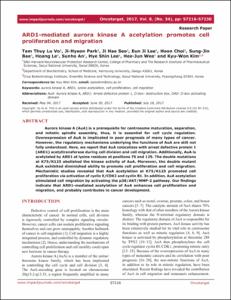ARD1-mediated aurora kinase A acetylation promotes cell proliferation and migration.
- Keimyung Author(s)
- Seo, Ji Hye
- Department
- Dept. of Biochemistry (생화학)
- Journal Title
- Oncotarget
- Issued Date
- 2017
- Volume
- 8
- Issue
- 34
- Abstract
- Aurora kinase A (AuA) is a prerequisite for centrosome maturation, separation, and mitotic spindle assembly, thus, it is essential for cell cycle regulation. Overexpression of AuA is implicated in poor prognosis of many types of cancer. However, the regulatory mechanisms underlying the functions of AuA are still not fully understood. Here, we report that AuA colocalizes with arrest defective protein 1 (ARD1) acetyltransferase during cell division and cell migration. Additionally, AuA is acetylated by ARD1 at lysine residues at positions 75 and 125. The double mutations at K75/K125 abolished the kinase activity of AuA. Moreover, the double mutant AuA exhibited diminished ability to promote cell proliferation and cell migration. Mechanistic studies revealed that AuA acetylation at K75/K125 promoted cell proliferation via activation of cyclin E/CDK2 and cyclin B1. In addition, AuA acetylation stimulated cell migration by activating the p38/AKT/MMP-2 pathway. Our findings indicate that ARD1-mediated acetylation of AuA enhances cell proliferation and migration, and probably contributes to cancer development.
- Keimyung Author(s)(Kor)
- 서지혜
- Publisher
- School of Medicine (의과대학)
- Citation
- Tam Thuy Lu Vo et al. (2017). ARD1-mediated aurora kinase A acetylation promotes cell proliferation and migration. Oncotarget, 8(34), 57216–57220. doi: 10.18632/oncotarget.19332
- Type
- Article
- ISSN
- 1949-2553
- Appears in Collections:
- 1. School of Medicine (의과대학) > Dept. of Biochemistry (생화학)
- 파일 목록
-
-
Download
 oak-2018-0122.pdf
기타 데이터 / 5.77 MB / Adobe PDF
oak-2018-0122.pdf
기타 데이터 / 5.77 MB / Adobe PDF
-
Items in Repository are protected by copyright, with all rights reserved, unless otherwise indicated.